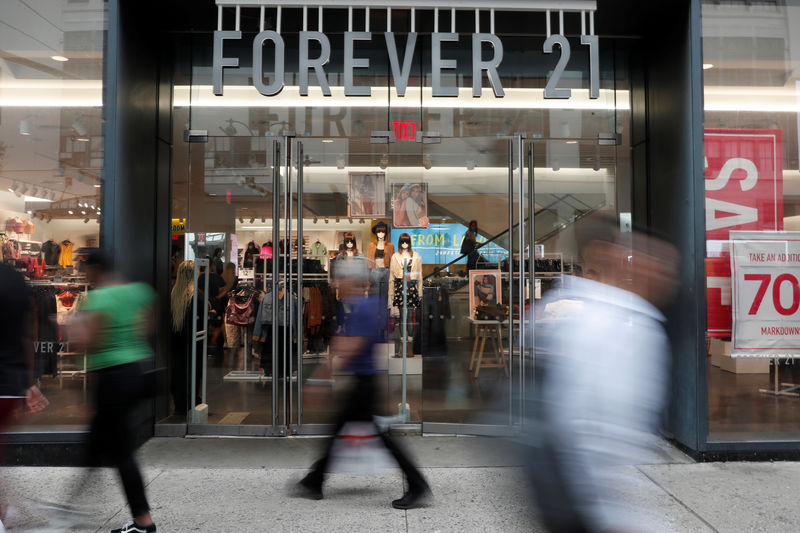By Rama Venkat and Aishwarya Venugopal
(Reuters) - Fast-fashion retailer Forever 21 filed for bankruptcy late on Sunday, joining a growing list of brick-and-mortar companies that have seen sales hit by the rise of competition from online sellers like Amazon.com Inc (O:AMZN) and the changing fashion trends dictated by millennial shoppers.
Forever 21 Inc, the privately held company that helped popularize trendy and cheap clothing, has fallen out of favor with shoppers, in part due to other retailers like Sweden' H&M and Spain's Zara that churn out affordable styles similar to those recently seen on designer runways.
Younger and more environmentally conscious shoppers are also choosing brands that ethically source garments instead of retailers that use cheap fabrics to make T-shirts that are snapped up for $5. Resale sites like thredUp.com, which calls itself the largest online thrift store, are also growing in popularity.
Forever 21, which has 815 stores in 57 countries, said the restructuring will allow it to focus on the profitable core part of its operations and shut stores in some international locations.
It has requested court approval to close up to 178 U.S. stores outside of its major markets.
On its website on Monday, Forever 21 sales included tops that started at $3 and dresses, handbags and jewelry and pants for $20 and under.
Gabriella Santaniello, founder of retail research firm A-Line Partners, said the bankruptcy would likely create pressure on other clothing retailers as Forever 21 slashes prices to clear inventory.
She said the chain did little to differentiate itself from others and also has very large store leases to support.
"They used to have a bit of an older customer, but customers have become more conscious of where they spend their dollars. They want sustainability, they want to feel represented and I don't think Forever 21 particularly stood for any of this," she said.
Founded in 1984 and headquartered in Los Angeles, the apparel retailer said it will close most of its stores in Asia and Europe but would continue operations in Mexico and Latin America.
Since the start of 2017, more than 20 U.S. retailers including Sears Holdings Corp (PK:SHLDQ) and Toys 'R' Us have filed for bankruptcy as more customers shop online and eschew large malls.
Forever 21 also said on Sunday its Canadian subsidiary filed for bankruptcy and it plans to wind down the business, closing 44 stores in the country.
"Slimming down the operation and reducing costs is only one part of the battle. The long-term survival of Forever 21 relies on the chain creating a sustainable and differentiated brand," Saunders said.
Forever 21 lists both assets and liabilities in the range of $1 billion to $10 billion, according to the court filing in the U.S. Bankruptcy Court for the District of Delaware.

The retailer, which filed to reorganize under Chapter 11 bankruptcy protection, said it received $275 million in financing from its existing lenders, with JPMorgan Chase (NYSE:JPM) Bank NA as agent, and $75 million in new capital from TPG Sixth Street Partners and certain of its affiliated funds.